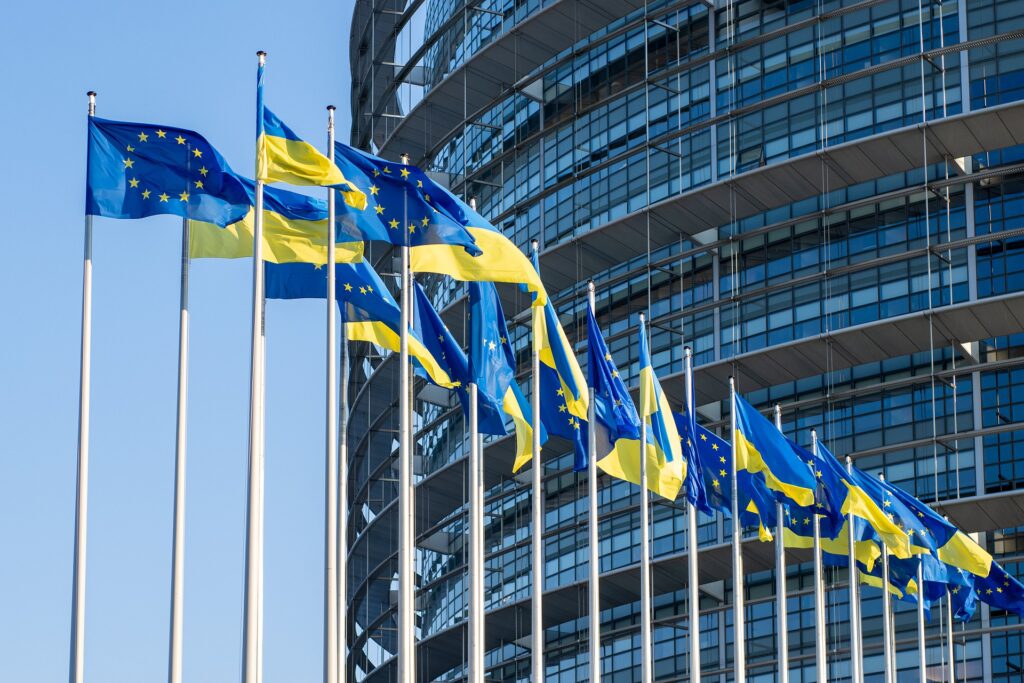In response to the Russian invasion of Ukraine, The Centre for Religion in Society brought together a panel of our own experts at York St John to discuss the international political context and the human suffering of the Ukrainian population. We present the transcripts of the panel’s thoughts here.
Dr Sam Jarvis, Lecturer in International Relations
Responding to the war in Ukraine: What role for the United Nations?
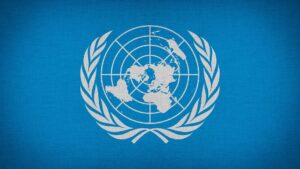 In response to the Russian invasion of Ukraine, the United Nations and the Security Council in particular, has appeared largely toothless in addressing a clear violation of the UN Charter. Yet the apparent dysfunction of the Security Council is arguably not a new dynamic. Over recent years the Council has become far less effective as a political deal maker or as an instrument through which crises can be averted or brought to a peaceful end. Back in 2019, UN Secretary-General Antonio Guterres lamented the increasing divisions between key permanent Security Council members, during a period of significant fragmentation and a growing and complex list of global challenges. The invasion of Ukraine therefore marks an acceleration of this trend and a more fundamental geostrategic shift, whereby a return to elements of the pre-1989 world will likely shape the dynamics of the Security Council moving forward.
In response to the Russian invasion of Ukraine, the United Nations and the Security Council in particular, has appeared largely toothless in addressing a clear violation of the UN Charter. Yet the apparent dysfunction of the Security Council is arguably not a new dynamic. Over recent years the Council has become far less effective as a political deal maker or as an instrument through which crises can be averted or brought to a peaceful end. Back in 2019, UN Secretary-General Antonio Guterres lamented the increasing divisions between key permanent Security Council members, during a period of significant fragmentation and a growing and complex list of global challenges. The invasion of Ukraine therefore marks an acceleration of this trend and a more fundamental geostrategic shift, whereby a return to elements of the pre-1989 world will likely shape the dynamics of the Security Council moving forward.
Central to the construction of the UN Charter back in 1945 was its ambition to greatly restrict the use of force by states against each other, thus limiting its use to self-defence or through the direct authorisation by the Security Council to restore international peace and security. The aggressive actions taken by Russia in Ukraine can be seen to constitute a blatant disregard for the Charter and its stated principles and yet the Security Council continues to be held hostage by the Russian veto and internal divisions.
As a consequence of the Security Council’s deadlock, discussions and debates surrounding potential Charter reforms have re-emerged, sparking calls for new measures to restrict the use of the veto in situations of aggression or to simply remove the veto altogether. Other reform ideas put forward include initiatives to change the make-up of the Council itself to reflect the world today rather than in 1945 and to reimagine the power relationship between the Security Council and the General Assembly. However, given the pressing nature of the humanitarian situation in Ukraine, I believe that any talk of reform must be caveated by the fact that significant reform has not been possible in the past and any attempt at reform will be a slow and arduous process. In the current moment, reform will not be the immediate solution to the crisis and thus one must turn to other UN avenues beyond the dysfunction of the Security Council.
On March 2nd, the UN General Assembly passed a historic vote criticising Russia’s action in Ukraine, supported by 141 member states. This “Uniting for Peace” resolution was the first of its kind adopted in four decades, in which a situation deadlocked in the Security Council was passed to the General Assembly to vote on. Demonstrating Russia’s isolation, only Belarus, North Korea, Eritrea, and Syria were willing to vote against. Yet the vote did also highlight some other signs of division, with notable BRICS states China, India and South Africa all choosing to abstain in the vote.
Perhaps of further geostrategic significance was the caution shown by several African states, in which 28 voted for the resolution, 17 abstained, 8 did not participate and Eritrea voted with Russia. What this highlighted was the continued influence of Russia in the security dynamics of many African states, including the Russian backed Wagner mercenary group which has been involved in several ongoing conflicts on the continent, most recently in Mali.
Subsequently, whilst the “Uniting for Peace” resolution was an important symbolic act it doesn’t lay the groundwork for specific action. The announcement from France and Mexico that they will draft a resolution calling for a cease-fire in Ukraine through the General Assembly offers another opportunity to generate international pressure on Russia. However, it is unfortunately unlikely to significantly change the current reality on the ground given Russia’s initial hostility towards the proposal.
So what else can the UN do? Certainly, in the short term, the UN will have to make greater use of key humanitarian agencies to help mitigate the significant human costs of the conflict and address the wars global ramifications. Back on Monday 14th March, Antonio Guterres acknowledged the wider economic implications, suggesting that “a sword of Damocles hangs over the global economy, especially in the developing world”. This was highlighted in stark terms by the fact Ukraine alone provides more than half of the World Food Programme’s wheat supply. The UN will therefore need to push states into further increasing humanitarian and development support or potentially risk severe economic consequences for developing states, who have already been significantly impacted by the Covid-19 pandemic.
Looking forward, the Security Council appears set to continue facing significant division and fragmentation but there is still a critical role for the UN to play. The Ukraine crisis marks one of the most serious tests for global multilateralism in decades and it is vital that the UN doesn’t become simply a bystander. Fulfilling its humanitarian role will go some way to avoid this fate but cannot be an overall solution to resolving this crisis. What the war in Ukraine has further crystalised is the limitations of the UN system to resolve the most challenging security issues. The dysfunctional nature of the Security Council will unfortunately have lasting and significant consequences for conflicts far beyond Ukraine for many years ahead.
Dr Ayla Gol, Senior Lecturer in International Relations
Turkey’s Position at NATO and The Russian invasion of Ukraine
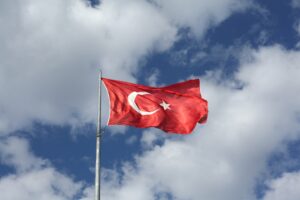 The importance of geopolitics once again put Turkey in entangled relations due to the Russian invasion of Ukraine. Since the end of the Cold War, the existence of NATO (North Atlantic Treaty Organisation) against the perceived threat of the Soviet Union has been questioned. When Russian President Vladimir Putin claimed the expansion of NATO was a key reason to launch a ‘special military operation’ in Ukraine, it has tested the military organisation’s political power against Russia in a new century. As a member of NATO, Turkey has found itself in a zero-sum game between Moscow, Kyiv and Washington. Furthermore, Turkish President Recep Tayyip Erdogan’s increased relations with Putin on a personal level further complicate Ankara’s already entangled position in regional politics.
The importance of geopolitics once again put Turkey in entangled relations due to the Russian invasion of Ukraine. Since the end of the Cold War, the existence of NATO (North Atlantic Treaty Organisation) against the perceived threat of the Soviet Union has been questioned. When Russian President Vladimir Putin claimed the expansion of NATO was a key reason to launch a ‘special military operation’ in Ukraine, it has tested the military organisation’s political power against Russia in a new century. As a member of NATO, Turkey has found itself in a zero-sum game between Moscow, Kyiv and Washington. Furthermore, Turkish President Recep Tayyip Erdogan’s increased relations with Putin on a personal level further complicate Ankara’s already entangled position in regional politics.
Historically, the legacy of imperial rivalry between the Ottomans and Russians over the Balkans, Central Asia, the Caucasus and the Black Sea influenced the relations between two countries and peoples. Geographically, Turkey shares a maritime border with Russia and Ukraine in the Black Sea, where the Turkish Straits has determined the country’s geostrategic importance for centuries. The threat of Russian desire to have access to ‘warm waters’ – the Mediterranean via the Straits – forced Turks to search for alliances to balance against Moscow. During the Crimean War of 1853-56, the Ottomans secured themselves with the support of Britain, France and Sardinia. While Nicholas I referred to the weakening empire as the ‘sick man of Europe’, the Sublime Porte was included within the Concert of Europe by the Treaty of Paris in 1856. The First World War was a turning point for the faith of the Ottomans when they lost with Germans against the Russians. Turkey then chose the West against the threat of the Soviet Union and joined NATO after the Second World War. Throughout the twentieth century, Turkish governments sustained pro-Western policies.
After the Cold war, while international politics seemed to be less ideologically divided, Turkey pursued ‘good neighbourly’ relations with Russia to establish economic, strategic, and energy links between East and West. The creation of buffer states (including Ukraine) in the post-Soviet space shielded Turkey from the direct military threat. It allowed Ankara to pursue a more active engagement in Eurasian politics. Turkey’s cultural ties with the Turkic Republics of Central Asia increased its geostrategic role in regional competition. Under Erdogan’s Presidency, Turkish-Russian economic relations have reached a high level of dependency: Turkey imports natural gas (around 45 %) and wheat (70 %) from Russia. While the Russian market is attractive for Turkish construction companies and exporters, tourism is another primary source of the Turkish economy (around 5 million Russian and Ukrainian tourists visit the Mediterranean resorts annually). Furthermore, the first Turkish nuclear power plant at Akkuyu will be built by Russia’s state-owned Rosatom by May 2023. However, Ankara-Moscow relations have not progressed without tensions: Putin and Erdogan disagree on the conflicts in Syria, Libya and Nagorno-Karabakh between Armenia and Azerbaijan.
As one of the buffer states in post-Soviet space, Ukraine has become a new economic and geopolitical partner for Turkey. Trade between Ankara and Kyiv has increased rapidly since the Ukrainian Revolution of Dignity in 2014 and reached $7.4 billion in 2021. In February 2022, Ankara and Kyiv signed a free trade agreement. Strategically, Turkey never recognised the Russian invasion of Crimea in 2014. From Ankara’s perspective, history repeats itself because Crimea is strategic for changing the balance of power in the Black Sea. When Ukrainian President Volodymyr Zelensky tactfully requested Turkey evoked the Montreux Convention of 1936, which allowed Ankara to regulate the passage of warships through the Straits for the first time since the Second World War. Ankara’s decision to classify the Russian-Ukraine conflict as a ‘war’ also rejected Putin’s official claim as a ‘special military operation’.
Turkey has continued to supply humanitarian aid and military equipment to Ukrainian resistance, most notably the Turkish drones. Erdogan continued to leverage its relations with Putin and Zelensky to pursue a pragmatic balancing act during an international crisis. For some, Erdogan took advantage of the situation by positioning Turkey as a mediator. Indeed, if Erdogan is victorious, the Ukraine crisis can help Ankara amend its relations with NATO and Washington. Turkey’s recent purchase of Russian S-400 anti-craft missiles and Erdogan’s anti-American discourses have strained its relations with NATO members. Since US President Jo Biden’s inauguration, Ankara has attempted to improve relations with Washington by participating visibly in NATO exercises in the Black Sea and improving relations with Israel.
On 10 March, Turkey hosted the first high level of diplomatic negotiations between the Russian and Ukrainian foreign ministers. Ankara did not join European states imposing economic sanctions on Russia to avoid harming its relations with Moscow. Turkey is not a member of the EU to observe the sanctions, and also Erdogan knows how this will harm relations with Putin and damage the Turkish economy. The pragmatic foreign policy of Turkey to act as a mediator between Russia and Ukraine has been shaped by history, geopolitics and economic relations but conditioned by its NATO membership. On 21 March, the peace talks had not yet made any significant progress. The continuation of war with deepening humanitarian crisis and the possibility of Putin’s use of biological or chemical weapons might force NATO to have a new calculus on how to support the Ukrainian resistance to remain as an independent sovereign state. This will put pressure on Erdogan to prove that Turkey remains a reliable strategic partner in regional and international security.
Dr Vicky Nesfield, Lecturer in Religion
Never Again… Again: History and the Question of Intervention
On the third day of the invasion into Ukraine, President Volodymyr Zelensky addressed the EU with a pointed statement about Europe’s darkest moment, and the maxim that emerged from it:
“Europe said, ‘Never again,’ but here we are.”
He repeated this in a Hebrew-language post on Facebook following the shelling of the Babi-Yar memorial near the Ukrainian capital, underscoring the recurrence of anti-Semitism:
“We all were bombed last night in Kyiv, and we all died again at Babyn Yar from the missile attack, even though the world pledges ‘Never again.’”
Zelensky has demonstrated his flair for well-aimed rhetoric since then, evoking Churchill’s famous wartime speech in his address to the House of Commons, drawing parallels with 9/11 to US Congress, and reminding the Bundestag of Germany’s Nazi past. Whatever ennui we might feel about the term, the historical resonance of Never Again is sharper in Ukraine, where the references to Nazism and genocide are more than grand rhetoric but are the long shadows cast from the Second World War.
Ukraine in 1941 was the battleground of Operation Barbarossa, the Nazi invasion of the Soviet Union. By this point, appeasement had already demonstrably failed. The Munich Agreement indicated that Allied Europe was prepared to witness the carving up of frontier countries in the interests of protecting their own. Neville Chamberlain’s desire for “peace with honour and a nice quiet sleep,” surely signalling Allied hesitancy. The reluctance of the West to put themselves in the firing line is clearly echoed in the narrative of the war in Ukraine, albeit with due recognition of NATO policy. The irony of Munich hosting February’s security conference four days before the invasion, requires no elaboration.
Throughout this conflict news footage from Ukraine has been punctuated by concerns about the impact of war on the economy and the cost of gas, even increasingly earnest questions about the possibility of nuclear war. The video-link addresses to Western seats of Government, compared with the visit to Kyiv from Eastern European leaders suggests a chasm emerging between those buffer nations, in whose living memory Soviet might is already seared, and those further away, for whom vested interests and years of turning a blind eye are only now starting to bite.
Back to 1941. In September, three months into Operation Barbarossa, at the Babi Yar ravine near Kyiv, almost 34,000 Jews were executed by the German Einsatzgruppen, accompanied by local auxiliaries, thus beginning the Nazism accusation that Russia continues to propagate to its own political ends in this conflict. Further massacres, including of Soviet PoWs, took place until 1943, further fuelling the post-war narrative in the East that remembered the crimes of Nazism as anti-Soviet; the specific targeting of Jews rendered invisible. It was not until the fall of communism that the reclaiming of Holocaust memory and a reluctant reappraisal of the history books started, but even this has been a slow and politically hindered exercise.
As recently as September 2021, the memorial at Babi Yar, was on Ukraine’s agenda and the politics of memory still as hot as ever. Competing initiatives sought to create commemoration projects, but with differing narratives: one, now stalled, positioning Ukraine as a victim nation crushed between the twin totalitarian regimes of Nazism and Soviet Communism. A second, supported by Zelensky, the State of Israel, and two Ukraine-born Russian oligarchs, foregrounding the Jewish catastrophe and reflecting on issues of nationalism and collaboration under the Nazi occupation.
The sanctioning of oligarchs, accusations of genocide from Ukraine and Russia, and more pragmatically, the enormous task of rebuilding Ukraine’s devastated infrastructure means that Holocaust memorialisation will take a back seat when the conflict reaches an end, but a new debate on current war crimes has begun. Raphael Lemkin’s 1944 concept of genocide led to the 1948 UN CPPGC, although Lemkin’s notion of cultural genocide is not recognised. Political negotiations relating to Soviet abuses at the time made the UN definition controversial. While elements of this conflict bear motifs of past conflicts recognised as genocides or ethnic cleansing, the fundamental requirement to demonstrate intent means that current claims Ukraine has submitted to the ICJ are unlikely to result in a declaration of genocide. For now, however, cultural memory of Nazism and genocide is proving to be a powerful touchstone for both Ukrainian and Russian political narratives, and a grim reminder of history for the rest of Europe. The atrocities of 1941 took place before the Wannsee Conference in which the “Final Solution to the Jewish Question” was decided. If they were a test to see if the West would forego diplomacy and nice quiet sleep to help the vulnerable at the other side of the continent, the West failed. 80 years on that same diplomacy is failing Ukraine before our eyes.
Professor Pauline Kollontai
Israel’s Geopolitical Response to Russia’s war against Ukraine
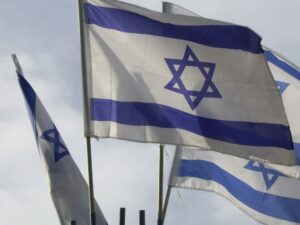 The Israeli government has stopped short of condemning Putin, and it refuses to join the US and European nations in imposing sanctions on Moscow, or on Russian businesses or financial interests of Russian oligarchs in Israel, and refuses to send military hardware to Ukraine. It has sent significant amounts of humanitarian aid. However, Israel did support the UN General Assembly’s resolution on 2nd March that “deplores in the strongest terms” the aggression by Russia and affirms the international community’s commitment to the sovereignty, independence, unity, and territorial integrity of Ukraine. In addition to sending humanitarian aid, Bennet has offered to mediate between Russia and Ukraine and met with Putin in Moscow on 6th March to discuss this.
The Israeli government has stopped short of condemning Putin, and it refuses to join the US and European nations in imposing sanctions on Moscow, or on Russian businesses or financial interests of Russian oligarchs in Israel, and refuses to send military hardware to Ukraine. It has sent significant amounts of humanitarian aid. However, Israel did support the UN General Assembly’s resolution on 2nd March that “deplores in the strongest terms” the aggression by Russia and affirms the international community’s commitment to the sovereignty, independence, unity, and territorial integrity of Ukraine. In addition to sending humanitarian aid, Bennet has offered to mediate between Russia and Ukraine and met with Putin in Moscow on 6th March to discuss this.
The question to be asked is why Israel, self-identified as Jewish and democratic, with a commitment in its Founding Declaration to uphold the Prophetic values of justice, peace, and freedom, and itself established after the devastating events of World War II, is behaving in such a cautious manner towards Russia? The answer is as follows:
1. Russia is a critical player regarding Iran’s nuclear program and has supplied Iran with nuclear reactors in the past. Russia could also play a disruptive role in the nuclear negotiations between Iran and the international community.
2. Israel faces a threat as Iran’s military presence grows in Syria and therefore it can arm Hezbollah with precision-guided missiles.
3. Russia has had a significant presence in Syria since 2015, supporting the Syrian government-led civil war. As a result, Russia controls Syrian airspace. Putin had already given permission in 2015 for Israel to enter Syrian airspace to attack Iranian targets when necessary. Recently Putin has indicated that Israel will continue to enjoy the freedom to operate in Syria
4. Russia has a large military presence and advanced weapons system in Syria on Israel’s northern border and has air and naval bases across Syria.
5. Both Russia and Ukraine have relatively large Jewish populations. Their safety and welfare are critical concerns for Israel.
Signs of disapproval of Israel’s cautious approach toward Putin have been growing amongst the liberal sectors of the Israeli public and media over the past two weeks. A wider public outcry was seen over the Refugee policy for non-Jewish Ukrainians, announced on Tuesday 7th March.
The policy placed a 5,000 limit on the numbers of non-Jewish Ukrainians allowed into Israel, they would receive a temporary visa for 3 months, and they would not be allowed to work in Israel. Non-Jewish Ukrainian citizens could submit an asylum application online to the Israeli Foreign Ministry and could only board a plane to Israel once their application was approved. Within a couple of days, the Israeli public outcry and the voices of some Knesset members and government officials meant the policy was changed. The 3-month temporary visa was removed, instead, refugees will sign a document agreeing to leave Israel once the war in Ukraine has ended. Also, they can board planes to Israel without waiting to have their application approved. Israeli Diaspora Minister Nachman Shai demanded that no limits be set on the number of non-Jewish Ukrainians wanting to enter Israel. (1)
So, are there any signs of change appearing in Israel’s strategy? One week into the war the Israeli Foreign Ministry formed a task force to investigate the interests of Russian business executives in Israel. Yair Lapid the Minister of Foreign Affairs has spoken out more critically. On 13th March during his visit to the border of Romania and Ukraine his statement indicated a more severe tone, ‘Israel, like Romania, condemns the Russian invasion of Ukraine. It is unjustifiable, and we call on Russia to cease its fire and aggression and to solve its problems at the negotiating table’. (2) On 15th March, Eran Etzion, previous Deputy Head of Israel’s Security Council, said that Bennett’s approach to Russia is wrong because of its potential to damage Israel’s strategic military alliance with America and Europe and that it throws into question Israel’s position as a democracy. (3) PM Bennett continues to say that the danger to the country’s security of upsetting Russia is too great a risk to take. This message is seen by some within Israel and the Jewish diaspora as a disregard for moral and humanitarian concerns, and for the Jewish principles and values of justice, freedom, and peace. As Israel’s former Defense Minister Moshe Ya’alon said, ‘Israel must address these events of historic proportions. We need to be on the right side of history, and the right side of history is not with Putin’. (4)
[1] Sokol, Sam. 2022. ‘Israel’s Diaspora Minister Calls for Unrestricted Entre of non-Jewish Ukranians’, Haaretz, March 9, 2022
[2] Lis, Jonathan. 2022. ‘Lapid Gest Call From Ukrainian FM After Snub over Israel’s Stance on Russian Invasion’, Haaretz, March 15th 2022.
[3] Podcast, ‘Democracy or Putin: Israel Must Choose a Side in Ukraine’, Haaretz, March 15, 2022.
[4] Ibid.
Dr Mark Dawson, Lecturer in Religion, Philosophy and Ethics
Public Theology and the response of the UK government to people fleeing the war in Ukraine
Drawing on my research area of Public Theology, I will touch on just one aspect of the intersection between insights of faith and the war in Ukraine.
I take Public Theology to mean the sharing of the insights of faith with a wide public beyond religious communities, contributing to issues of public interest, and by means of an open conversation.
I participated in a Pro-Ukraine rally in York on March 5th and observed that York City of Sanctuary was strongly in evidence. The organisation had been involved in setting up the event and the coordinator, Rev Paul Wordsworth, addressed the crowds from the Mansion House steps. The City of Sanctuary movement has Church roots and its supporters draw on the good will and support of churchgoers, working alongside people of other faiths and backgrounds, to enact care and compassion towards refugees and asylum seekers.
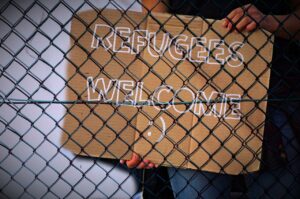 Politicians across the globe, utilising the populist ‘fear of the other’ as a means to garner support, have set out to create an environment which is hostile to people seeking to escape from persecution and conflict. The political philosopher, Jan-Werner Muller, points out that populists claim to define who ‘the people’ are and what they think, and crucially, they also decide who should be excluded. (i)
Politicians across the globe, utilising the populist ‘fear of the other’ as a means to garner support, have set out to create an environment which is hostile to people seeking to escape from persecution and conflict. The political philosopher, Jan-Werner Muller, points out that populists claim to define who ‘the people’ are and what they think, and crucially, they also decide who should be excluded. (i)
The refugee is de-humanised and defined as a ‘problem’ or as part of a threatening form, such as a flood or plague. Sadly, this does succeed in shaping public opinion, which in turn is used to justify more stringent controls to block those trying to reach a safe haven.
There is a role here for Public Theology in attempting to break this vicious circle. Counter-cultural ways of thought are needed to interrupt the paradigm.
The outlook of hospitality and welcome associated with many religions, including the Christian Faith, can serve as such a source. Theologian, Susanna Snyder, describes the Church’s work with refugees and asylum seekers and identifies a Christian outlook that preferences the most unfortunate in society, those who have very few possessions and very low status. (ii)
Although there are voices within the Church that support the paradigm of hostility, in many ways grassroots churchgoers have endeavoured to put theology into practice. Churches and other faith communities have been involved in providing practical support to refugees and asylum seekers, have worked to try and unite families and, through symbolic and practical activism, have campaigned to move towards a system that is more welcoming of those in distress.
The public response to the conflict in the Ukraine has also served to interrupt the paradigm of fear and hostility towards refugees. Moved by the terrible brutality that civilians have been subjected to, and the recognition of their powerlessness in the situation, a sympathetic climate has been kindled. One can but hope that this marks a paradigm shift, with the realisation that this can happen to anyone, even to people we perceive to lead lives similar to our own.
What a contrast this is to the response to the War in Syria but, nevertheless, the shift in hearts and minds is to be welcomed.
The UK government has been remarkably slow to respond to the concerned attitude of the British public towards Ukrainian refugees. This underlines the embedded nature of the culture of hostility.
Care and compassion are replaced by a stultifying legalistic approach. A mixture of Kafkaesque indifference and sheer callousness, as key government figures mouth support for the people of Ukraine, whilst going out of their way to ensure that as few Ukrainians as possible receive sanctuary here. Catherine Briddick, of the University of Oxford’s Refugee Studies Centre, points out that UK requirements for visas effectively contradict the 1951 Refugee Convention, which protects people from being rejected at frontiers ‘for entering a country without permission.’ (iii) Briddick argues that the visa system institutes just such a form of permission. (iv)
She also sets the potentially illegal response in the context of the Nationality and Borders Bill that is passing through Parliament.(v) This paves the way to criminalise people who are seeking protection and will make it much more difficult for them to achieve refugee status. Briddick comments that the United Nations High Commissioner for Refugees has stated that the proposed system will undermine ‘established international refugee rules and practices.’ (vi)
With these plans afoot, scant wonder that the government is squirming in the face of public pressure to let those most in need in this conflict seek sanctuary in our country. It also explains the disgraceful levels of inaction.
We feel very powerless in the face of the terrible war in Ukraine, but one thing that we can do is to lobby and campaign for the UK to welcome people who are fleeing violent conflict.
i See Muller, Jan-Werner (2017) What is Populism? London: Penguin
ii Snyder, Susanna (2012) Asylum-Seeking, Migration and Church. Farnham: Ashgate
iii Briddick, Catherine (2022) The UK is failing to meet its obligations to refugees from Ukraine. The Conversation. https://theconversation.com/ukraine-the-uk-is-failing-to-meet-its-obligations-under-the-1951-refugee-convention-178692 Accessed 16th March 2022
iv ibid.
v ibid.
vi ibid.
